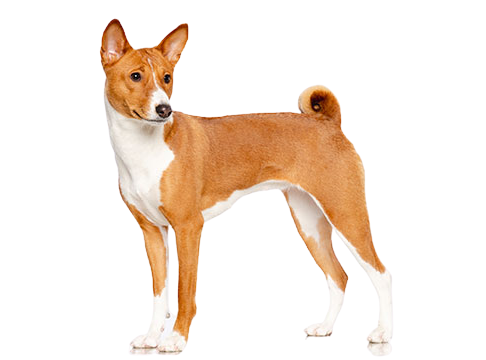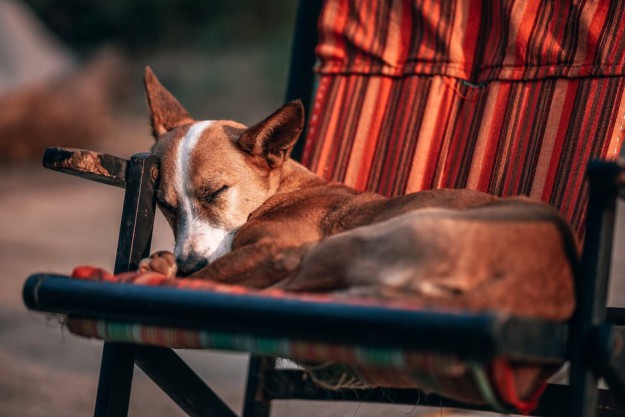
Basenji
USD $1000-$1200 Price Avg.
Hunting Dogs
Group
Purebred
Breed Type
Medium
Size
10-12 years
Lifespan
Breed Information
| Group | Hunting Dogs |
|---|---|
| Popularity/Rank | 84 |
| Origin | Democratic Republic of the Congo |
| Other Names | African Barkless Dog, African Bush Dog, Ango Angari, Congo Dog, Congo Terrier, Zande Dog |
| Breed Type | Purebred |
| Price (Avg.) |
USD $1000-$1200
How much does it cost to buy a Basenji? Basenji are usually priced differently from breeder to breeder and from place to place. As a rough guide, you can expect to pay between $1000 to $1200 if you purchase your dog from a reputable breeder. The price will increase if the dog has a fantastic pedigree. Dogs that already have basic training maybe even more expensive. But, most Basenjis can be adopted through a shelter for a lower fee. |
| Size | Medium |
| Weight |
Male: 22-26 pounds (10-12 kg),
Female: 20-25 pounds (9-11 kg) |
| Height |
Male: 16-17 inches (41-43 cm),
Female: 15-16 inches (38-41 cm) |
| Lifespan | 10-12 years |
| Recognized by |
AKC, FCI
The American Kennel Club in 1944 as a Hound breed. And FCI in the Spitz and primitive types group, in the Primitive type section. |
| Purpose | Hunting Small Game |
| Date of Origin | Ancient |
| Ancestry | African Bush Dog |
Appearance & Maintenance
| Coat | Fine |
|---|---|
| Coat Colors | Black, Brindle, Red, Tan, White |
| Grooming Level | |
| Shedding Level | |
| Eye Color Possibilities | Amber, Brown, Hazel |
| Nose Color Possibilities | Black, Brown |
| Coat Color Possibilities | Black, Brindle, Red, White |
| Coat Length | Small |
| Coat Density | Normal |
| Coat Texture | Straight |
| Recommended Brushes | Deshedder, Nail Clipper, Slicker Brush |
| Brushing Frequency | Weekly |
Breed Characteristics
| Temperament | Affectionate, Alert, Caring, Curious, Energetic, Intelligent, Playful, Sportive, Vigilant |
|---|---|
| Intelligent | |
| Trainability | |
| Playfulness | |
| Sensitivity Level | |
| Affection Level | |
| Social Interaction Required | |
| Barking | |
| Watchdog Ability | |
| Territorial | |
| Biting Force | Low |
| Mouthiness | |
| Impulse to Wander or Roam | |
| Prey Drive | |
| Adaptability | |
| Tolerates Being Left Alone | |
| Fighting Dog | Yes |
Good & Friendly with
| Apartment Life Friendly | |
|---|---|
| Stranger Friendly | |
| Kid-Friendly | |
| Cat Friendly | |
| Dog Friendly | |
| Office Friendly | No |
| Senior Citizens Friendly | |
| Pet Friendly | |
| Friendly with First Time Owners | Yes |
| Service Dog | Not really |
| Therapy Dog | Not really |
| Detection, Sniffer or Security Dog | Not really |
| Search and Rescue Dog (SAR) | Not really |
| Boat Dog | Not really |
| Cart Pulling or Drafting Dog | Not really |
Health Elements
| Health Issues | |
|---|---|
| Hypoallergenic | No |
| Energy Level | |
| Exercise Required | |
| Sleeping Required | |
| Weight Gain Potential | |
| Weather & Climate | Prefers warm weather |
| Stinkiness | Low |
| Drooling tendency | |
| Activity Level | Moderate |
| Rec. Walk Mileage Per Week | 15 miles |
| Minutes of Activity Per Day | 90 minutes |
Food & Costing
| Avg. Daily Food | 3/4 to 1 cup of high-quality dry food a day, divided into two meals. |
|---|---|
| Cups Per Day | 2.5 cups |
| Daily Cost | $1.20 - $1.40 |
| Monthly Cost | $34.00 - $45.00 |
Reproducibility
| Gestation Duration | 60-64 days |
|---|---|
| How often can the Basenji have a litter? | Once a year. |
| Litter Size | 4-5 puppies (Once a year.) |
Description
The Basenji dog is a small, short-haired breed of hunting dog originating from Central Africa. It is known for its distinctive barkless sound and its intelligence. The Basenji has a unique appearance, with a short muzzle, erect ears, and an alert expression. Its coat is usually reddish-brown or black with white markings on the chest and feet.
The average lifespan of the Basenji is between 10 to 12 years. They typically weigh between 18 to 22 pounds and stand at 16 to 17 inches tall at the shoulder. The colors of their coats can range from red, black, tricolor (black/tan/white), brindle (black stripes on a red background), or sable (red with black tips).
Basenjis are known for their independent nature and intelligence. They are loyal to their owners but can be aloof around strangers. They are also very active dogs that need plenty of exercise in order to stay healthy and happy.
Basenjis are generally friendly towards other dogs but may be wary of unfamiliar animals or people if not properly socialized as puppies. They tend to get along well with children if they have been raised around them since puppyhood; however, they may become overly protective if not properly trained in obedience commands such as “sit” or “stay” when interacting with children or other animals in the home environment.
The temperament of the Basenji is often described as being playful yet dignified; they enjoy playing games such as fetch but also like spending time alone exploring their surroundings or lounging around the house when given the opportunity.
The health of Basenjis can vary depending on genetics; however, some common health issues include hip dysplasia, eye problems such as progressive retinal atrophy (PRA), hypothyroidism, Fanconi syndrome (a kidney disorder), and von Willebrand disease (a bleeding disorder). Regular veterinary checkups are recommended in order to detect any potential health issues early on so that treatment can begin promptly if necessary.
Basenjis have an average adaptability level; they do best in homes where there is someone available most days who can provide them with plenty of attention and exercise throughout the day while still allowing them some alone time when needed for restful sleep periods during off hours from playtime activities or training sessions . The benefits of having a Basenji as a pet include their intelligence which makes them easy to train; their loyalty which makes them great companions; their independence which allows them some freedom within boundaries set by owners; and lastly their playful nature which provides endless entertainment for both themselves and those around them!
History
The Basenji is a breed of dog that was originally from Africa. The breed is also known as the African Barkless Dog, because they do not bark like other dogs. They make a yodeling sound instead. The Basenji is one of the oldest breeds of dogs, and they are thought to be descendants of the ancient Egyptian hunting dogs. The breed almost became extinct in the early 1900s, but they were saved by a few dedicated breeders. The Basenji became popular in the United States in the 1950s, and they are now one of the most popular breeds in America.
The history of the Basenji dog can be traced back to ancient Africa. The breed is thought to be descendants of the ancient Egyptian hunting dogs. The name "Basenji" means "dog of the bush" in Swahili. The breed almost became extinct in the early 1900s, but they were saved by a few dedicated breeders. The Basenji became popular in the United States in the 1950s, and they are now one of the most popular breeds in America.
The Ancestry of the Basenji dog can be traced back to ancient Africa. The name "Basenji" means "dog of the bush" in Swahili. From where Basenji dog recognized as a breed? In 1954,the first Basenjis were brought to England from Congo by Mrs Irene Wright who owned two females called Bongo and Zande; these bitches were mated with an imported male called Bangi producing littermates Kiboko (hippopotamus), Kongoni (hartebeest) and Nzuri (pretty). These three names were chosen as they all mean something good in Swahili and other African languages spoken where Mrs Wright had previously lived; she hoped that her new venture would be successful! And so it proved to be with Kongoni going on to win Best Puppy In Show at Crufts just four years later




